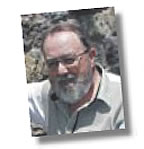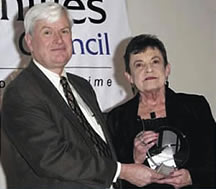
Vol. 16 No. 1 |
Summer 2006 |

 |
Pulitzer Prize-winner and former national poet laureate Mark Strand was a distinguished professor in English at the University of Utah when Continuum debuted. (In 1981, Strand joined the U of U faculty; he was Distinguished Professor from 1986 to 1994, when he became a faculty member at The Johns Hopkins University.) In 2005, Strand was featured in the collection Poets On Place, Interviews & Tales From the Road. Among the other poets featured in the collection, in which they discuss the significance of place in their work, are Kenneth Brewer PhD’73, Utah’s second poet laureate (see below); Donald Revell, U of U professor of English and director of the Creative Writing program; and Paisley Rekdal, an assistant professor of English at the U. Check out Poets on Place writer W.T. Pfefferle’s Web journal of his year-long journey around the country assembling material for the book project at http://wtp62.com/2003_08_10_archive.html.
Debra Monroe PhD’90 recently published her second novel, Shambles, which fellow alumna and successful writer Pam Houston ex’90 calls “A smart, funny, wry and winning book.” Monroe is the author of three previous books of fiction: the short story collection The Source of Trouble, which won the Flannery O’Connor Award; the collection A Wild, Cold State, which appeared in Best Ten lists in both Elle and Vanity Fair magazines; and the critically acclaimed novel Newfangled, which was nominated for a National Book Award from the National Book Foundation. A recipient of the John Gardner Fellowship to the Bread Loaf writers’ colony, Monroe currently teaches in the MFA program at Texas State University-San Marcos. She was inducted into the Texas Institute of Letters in 1998.
University of Utah archivist Roy Webb BA’84 MS’91 was just finishing his master’s degree when Continuum was launched. He has become an authority on Colorado River/Colorado Plateau history, and is now the author of 80-plus articles and four books; his most recent was High, Wide, and Handsome: The River Journals of Norman D. Nevills. Webb is also among the contributors to A Green River Reader, published in late 2005 by the University of Utah Press, which includes pieces on the river by observers from early American adventurers Kit Carson and John C. Frémont to contemporary naturalists Wallace Stegner, David Brower, and Edward Abbey.
Elizabeth M. Tornes PhD’90 recently published Memories of Lac du Flambeau Elders, a collection of interviews with 15 Ojibwe elders of the Lac du Flambeau Band of Lake Superior Chippewa Indians in northern Wisconsin. The elders, in their 70s and 80s when interviewed, relate the enormous changes that have occurred in their lifetimes, yet continue to cling tenaciously to traditions and beliefs, despite attempts at forced assimilation on the part of the U.S. government and others. The book includes a historical introduction going back 400 years to Lac du Flambeau’s original settlement. Black-and-white photographic portraits of each elder by Greg Gent preface each interview, and historical photos from the George W. Brown Jr. Ojibwe Museum and Cultural Center collection illustrate the text.
—Marcia C. Dibble is assistant editor of Continuum.
![]()
 In
June 2005, shortly after I interviewed Utah Poet Laureate Ken
Brewer PhD’73 for an article in Continuum (See
“Confronting the Cosmos,” Fall 2005), he was diagnosed with
pancreatic cancer. Afterward, he was confined to his home in Providence,
Utah, where he managed to outlive his doctor’s predictions and,
in the process, to learn much about life while preparing to confront its
conclusion. (“I measure my life in cancer that has taught me how
to measure my life,” he said during an interview with CBS News in
“A Life in Verse,” aired Dec. 18, 2005.)
In
June 2005, shortly after I interviewed Utah Poet Laureate Ken
Brewer PhD’73 for an article in Continuum (See
“Confronting the Cosmos,” Fall 2005), he was diagnosed with
pancreatic cancer. Afterward, he was confined to his home in Providence,
Utah, where he managed to outlive his doctor’s predictions and,
in the process, to learn much about life while preparing to confront its
conclusion. (“I measure my life in cancer that has taught me how
to measure my life,” he said during an interview with CBS News in
“A Life in Verse,” aired Dec. 18, 2005.)
During his confinement, Brewer continued to pen poems on a daily, or sometimes weekly, basis, depending on his energy level—as if a flurry of words and ideas would stall the passage of time (“I’m going to go out with a pen in my hand and a poem on the page,” declared Brewer). True to form, his “last” poems are honest, heartfelt, and passionate—not just because of what he was facing, bravely, but because he reached deeply inside to extract raw emotions and display them for all to see—and to share. For Brewer had decided early on to go public with his condition. He told the Salt Lake Tribune in a November 2005 interview: “It’s hard for me to understand people who get a diagnosis like this and then retreat into some kind of a shell and won’t tell anybody what’s going on. I think they miss an awful lot.”
Indeed.
Many of Brewer’s former students and friends stayed connected to him via an e-mail network, with weekly updates distributed by Brewer’s former student and protégé Star Coulbrooke, a creative writing instructor at Utah State University.
As Brewer’s illness progressed, awards and accolades to the poet abounded. He had interviews aired on CBS news and KUER’s RadioWest; the Utah Arts Council sponsored a reading of his poetry at Salt Lake City’s Main Library; Salt Lake Tribune columnist Holly Mullen BS’81 wrote a poignant tribute to him, and his colleagues and friends from the Logan area gathered at a local coffee bar to read aloud their favorite Brewer poems.
On Feb. 1, the Utah Humanities Council (UHC) honored Brewer for “his distinguished service to the humanities” at its annual “Human Ties Celebration.” The UHC cited Brewer as “the quintessential public humanities champion… a teacher, a writer, and poet laureate, [who] has worked tirelessly to assure that literature is accessible for all of us to enjoy.”
Brewer was unable to attend, but his wife, Roberta “Bobbie” Stearman, accepted the honor on his behalf.
Ken Brewer died on March 15, 2006.
One of his last poems recounts a moment he spent with his wife “Talking
in Bed” (see below). The poem is written in two columns, in which
the space between represents a visual symbol. It is read straight across,
with a brief pause across the gap. Coulbrooke suggests that the poem be
read aloud in order to “notice that lovely hesitation that holds
so much.”
TALKING
IN BED
For
Bobbie
My wife lies beside me
We talk about the day,
about the future. But
of joys and sorrows,Today's snow and cold
stories of our childhood
she in Utah, I in Indiana,
black and white pony.black vest and chaps,
on the back of an animal
an animal lesser than my
but with wet nostrils andhappy in that front-yard photo,
in my wife's lap, no words
with its hope of yet another
K.W. Brewer
Providence, Utah
11/26/05and I rest in her lap.
about the past, sometimes
the past, with its mosaic
shines brighter than the future.snuggles us into words,
pony photos. We posed,
on what we swear was the same
We wore the same cowboy hat,same smile, uneasy for me
I had seen only in comics
Roy Rogers and Trigger lamp,
sides heaving into my legs. I lookhappy in the past as I am today,
about tomorrow, that darkness
chance to speak.
 |
Utah Humanities Council board member Greg Thompson MA’71 PhD’81, assistant director for special collections at the J. Willard Marriott Library, presents Ken Brewer’s Distinguished Service Award to Brewer’s wife, Roberta “Bobbie” Stearman, at the council’s “Human Ties Celebration” on Feb. 1, 2006.
Read more about some of Brewer’s last published works in the March and April issues of the U of U Alumni Association newsletter, U-News and Views, at www.alumni.utah.edu/u-news.